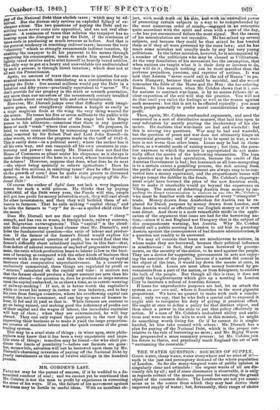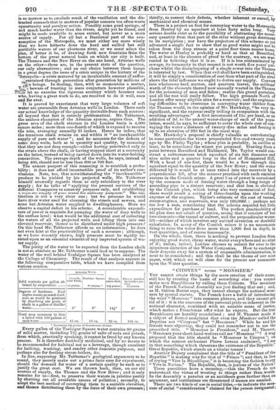THE WATER QUESTION: SOURCES OP SUPPLY. Goon water, cheap water,
water everywhere' and no stint of it such is the just and peremptory demand of the whole population of London. So far the many-tongued voice Of public opinion is singularly clear and articulate : the urgent wants of all are dis- tinctly felt by all ; and if some dissonance is observable, it is only as regards certain of the means proposed for securing the grand object of the common desire. The Londoners are not yet unani- -mobs as to the source from which they may best derive their improved supply of water; 'but, fortunately, their range of choice is so narrow as to preclude much of the vacillation and the dis- tracted counsels that in- matters of popular concern too often waste opportunity and paralyze action. Possibly some good springs, of not much harder water than the rivers, might yet be found, and might be made available to some extent, but never as a main source of supply. For all but a fractional part of the con- sumption of the Metropolis, we must either use more wisely than we have hitherto done the hard and sullied but still pnrifiable waters of our plenteous river, or we must adopt the plan, if better it be, of drawing. forth new fountains from the bottom of the great natural basin on which our city is built. The Thames and the New River on the one hand, Artesian wells on the other—these are, in the present state of the question, our only alternatives ; and on our choice between them hangs in a great degree the issue of a crisis unique in the history of the 'detropolis—a crisis matured by an incalculable amount of suffer-
sustained through generation after generation by millions of
in beings. In dealing, then, with so momentous a matter, ▪ 4. beware of trusting to mere conjecture however plausible, t.Lars let us exercise the rigorous scrutiny which becomes men who, having a great work to do, are resolved to do it well, once and for ever.
It is proved by experiment that very large volumes of soft water are procurable from Artesian wells in London. There ends our actual knowledge of the quantity derivable from such sources: all beyond that fact is entirely problematical. Mr. Tabberner, the zealous champion of the Artesian system, argues thus. The gross area of the chalk stratum in the London basin is 4,000 square miles ; more than one-fourth of which is exposed to receive the rain, averaging annually E inches. Hence he infers, that the tenacious chalk retains on and within it " an inexhaustible supply of pure soft water "; and he accounts for the defects of some deep wells, both as to quantity and quality, by assuming that they are not deep enough—either having penetrated only to the strata above the chalk, or having stopped short at a convexity on the latter, instead of being carried down into its water-holding concavities. The average depth of the wells, be says, instead of being 400, should not be less than 600 or 700 feet.
The utmost purport of this reasoning is to establish a proba- bility; it does not afford incontestible proof of its author's con- clusions. Note, too, that notwithstanding the " inexhaustible " produce to be yielded by his projected wells, Mr. Tabberner himself avowedly regards them as only subsidiary to the river supply ; for he talks of "applying the present services of the different Companies to sanatory purposes only, and establishing
bcpe. matc empply crf pLwro w-adter-fer Ina:no.27 pu.poeee." Tile clic.- tinction is not a very clear • one ; but we presume he would have river water used for cleansing the streets and sewers, and none but Artesian water supplied to dwellinghouses. Here we observe a capital defect in his scheme. A considerable expendi- ture of power is requisite for pumping the water of deep wells to the surface level : what would be the additional cost of collecting the waters of all the projected wells and lifting them into one elevated reservoir, thence to be distributed under high pressure ? On this bead Mr. Tabberner affords us no information ; he does not even hint at the practicability of such a measure ; although, as we have recently shown, high pressure must be rigidly in- sisted upon as an essential element of any improved system of wa- ter supply. The purity of the water to be expected from the London chalk is not so absolute as Mr. Tabberner would lead us to suppose. The water of the well behind Trafalgar Square has been analyzed at the College of Chemistry. The result of that analysis appears in the following comparative table, which we have compiled from various sources.
Solid contents per gallon ob- tamed by y evaporation.
Artesian Wells.
Thames, =purified
221 grains
Thames, purified by Clark's pro ces,
12 grains.
Grenelle, "" Paris,
10 grains.
Tkajaigar Square, 80 grains. •• Degrees of hardness. Each
degree means as much hard- ness as would be produced by dissolving one grain of chalk in a gallon of distilled water
Go
Go 140 4°
Curd soap necessary to form a lather with 100 gallons of
each water 15 oz. 15 oz. 32 oz.
1044. oz.
a Including 281 grains of bicarbonate of soda.
Every gallon of the Trafalgar Square water contains 80 grains of solid matter, including 72i grains 'of salts of soda and potash, from which, practically speaking, it cannot be freed by any known process. It is therefore decidedly medicinal, and by no means to be recommended for habitual use as a beverage, though excellent for bathing, washing, and sundry other domestic purposes, and perhaps also for feeding steam-boilers, &c. In fine, supposing- Mr. Tabberner's geological arguments to be sound, they merely make out a prima facie case for experiment, should the demand for water of a certain quality be-such as to justify the great cost. We are thrown back, then, on our old sources of supply, the Thames and the New River ; and it only remains for us—first, to preserve their waters in pristine purity by shutting out all avoidable causes of pollution ; secondly, to adopt the best method of conveying them to a suitable elevation, and thence distributing them by the force of their own pressure;
thirdly, to correct their defects, whether inherent or casual, by mechanical and chemical means.
There is a project on foot for conveying water to the Metropolis from Henley by an aqueduct at least forty miles long. Very serious doubts exist as to the possibility of abstracting the neces. sary quantity from that part of the river without great detriment to its navigation ; nor have the projectors of this scheme as yet advanced a single fact to show that as good water might not be taken from the deep stream at a point four times nearer home. The water at Henley is probably as hard as that at Brentford, and, at least in the absence of proof to the contrary, we are war. ranted in believing that it is so. If it is less contaminated by sewage, its immunity in that respect is not worth five years' pur- chase whilst the disemboguing of a single sewer into the Thames is tolerated by law. When that evil shall have been extinguished, it will be simply a consideration of cost from what part of the river above the tidal influence we ought to derive our supply. Convert into wholesome beef, mutton, and quartern loaves, the millions' worth of the elements thereof now annually wasted in the Thames for the poisoning of men and fishes; - realize this grand postulate, and all the rest will easily follow. The high grounds North of London offer many eligible sites for a reservoir; and the engineer. ing difficulties to be overcome in conveying water thither from the Thames would, in the opinion of Mr. Hawksley, "be very in- significant, and the expense really trifling in comparison with the resulting advantages." A first investment of 15s. per head, or an addition of 9d. to the annual water-charge of each of the popu- lation, would, he says, be sufficient to cover the whole cost of con- veying the water a distance of twenty-five miles and forcing it up to an elevation of 220 feet in the usual way.
Mr. Hawksley's proposal is chiefly valuable as corroborating in some particulars the views propounded five-and-twenty years ago by Mr. Philip Taylor ; whose plan is probably, in outline at least, to be considered the wisest yet proposed. Starting from a point between Brentford and Richmond, Mr. Taylor would con- struct a subterraneous brick aqueduct of six feet diameter and nine miles and a quarter long to the foot of Hampstead Hill. With a head of one foot, there would be a flow through this aqueduct equal to the quantity of the New River ; and the water delivered by it would be at once raised into the reservoir by a perpendicular lift, after the manner practised with such eminent success in the Cornish mines. A great loss of power is occasioned by the common mode of forcing water through a long range of ascending pipe to a distant reservoir; and that loss is obviated by the Cornish plan, which being also very economical of fuel, there would result a saving .af three fourths upon the working expense of the engines. Taylor's estimate of the cost of tunnel, steam-engines, and reservoirs, was only 180,0001. : perhaps not too low a sum, considering that .the scheme required but little expenditure for purchase of land. The perfect practicability of his plan does not admit of question, seeing that it consists of but two elements—the tunnel or culvert, and the perpendicular water- lift—neither of which involves any untried invention or doubtful calculation. In many of the Cornish mines it is no uncommon thing to raise the water from more than 1,000 feet in depth, in vast quantities, and of course incessantly. On the whole, then, there is nothing to prevent London from enjoying good water, cheap water, water everywhere and no stint of it ; unless, indeed, London chooses to submit for ever to the iniquitous dictation of the Water Companies. How to exchange their despotic sway for a system of responsible administration, is next to be considered ; and this shall be the theme of our next paper, with which we will close for the present oar comments upon the Water question.



























 Previous page
Previous page